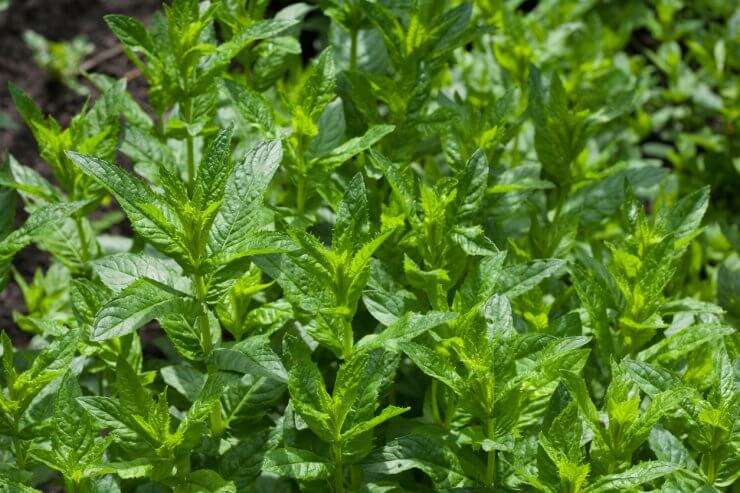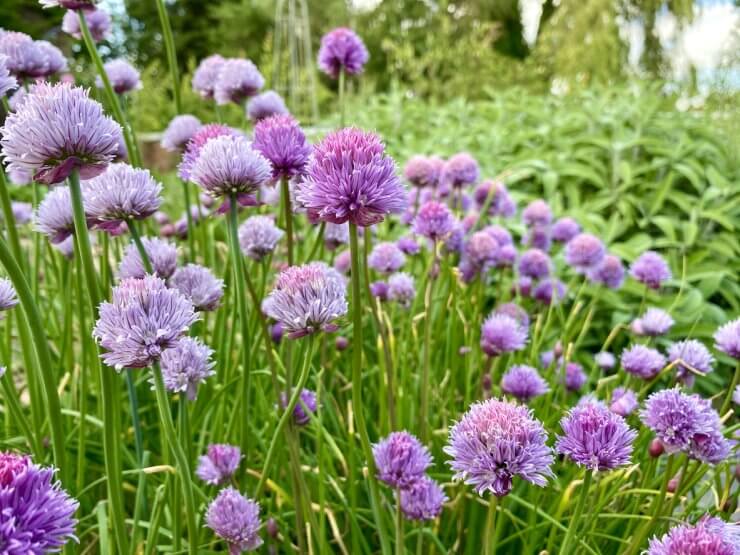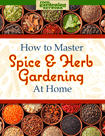
Invasive herbs? I know that’s not how I usually think of invasive species. When I think of invasive species, it’s usually things like boa constrictors in the Everglades, carp in the Great Lakes, or perhaps kudzu in the southeastern U.S. Or murder hornets. Murder hornets are definitely invasive.
As it turns out, though, some herbs can be pretty darn invasive. The Invasive Plant Atlas of the United States lists more than 800 herbaceous plants they consider invasive. This list includes a number of ferns, flowers, grasses, and other plants that don’t fall into the culinary herb category. However, they also list things like fennel and lemon balm.
Let’s make things easy on ourselves, though. For our purposes here, I’m considering invasive herbs to be those that seem to have growing superpowers and will take over your garden if you aren’t diligent.
Find out how easy growing spices and herbs can be—indoors or out! Read our FREEBIE How to Master Spice and Herb Gardening at Home right now!

Slowing the spread of invasive herbs in your vegetable garden
First, let me say that I love having some of these invasive herbs in my garden. My mint comes up reliably every year, no matter how much I neglect it or how cold it gets here in New England. Honestly, if single-digit temperatures and drought don’t kill it, I don’t know what would.
I also love having mint around to make tea, use in various recipes, and even as part of a bouquet to bring an energetic aroma into a room.
Chives are another excellent example. They deter numerous pests, they’re fabulous in the kitchen, and when they flower, they attract pollinators. I could go on about the many reasons these invasive herbs deserve a spot in the garden, but you get the idea.
As much as I love them, I still want some space in the garden for tomatoes and peas and squash and whatever else I want to grow. So how do we find a balance? Is there a good way for these herbs and the rest of your garden to coexist peacefully? Yes, it just takes a little work on your part.
Most of these invasive herbs spread in one of two ways. They either send out runners, or they produce seeds that spread easily and thrive. Those that spread through re-seeding can be a little more challenging to control since wind and rain can both help spread the seeds around.
You have a few options here, but your best chance of containing these herbs is to deadhead them the moment the flowers start to dry and go to seed. You could even pinch off the flowers when they first appear, though that does deprive you and your pollinator friends of their benefits.
Another option is mulching. A thick layer of mulch around your herbs can help prevent seeds from sprouting and growing. And if despite your best efforts, you find that herbs are spreading and taking up too much space, you can always pull them just like you would any weeds.
Herbs like mint, oregano, and thyme that send out runners are somewhat easier to contend with. In many cases, a good barrier will help contain these invasive herbs. They thrive in containers, so that’s certainly a good option. Just be aware that you may need to repot them somewhat regularly.
Another option for herbs in the ground or a raised bed is to place physical barriers into the soil around them. Metal or plastic edging will work, but you need to get these reasonably deep into the ground. I’ve seen some sources that suggest 10 to 12 inches, or the runners will dig down until they can escape.
Of course, you can also try to catch them and dig them up whenever they pop up, but at that point, you’re behind the curve. I’m not saying it’s impossible, but you will need to work harder.
One last suggestion in case you do have invasive herbs that are taking over your garden. If you haven’t found any other way to keep them in check, you could always just live with them and make a whole lot of custom-blended tea for your friends and neighbors!
Have you found a good way to prevent fast-growing herbs from taking over your garden? Let me know in the comments.
Find out how easy growing spices and herbs can be—indoors or out! Read our FREEBIE How to Master Spice and Herb Gardening at Home right now!





Use herbs in EVERYTHING….adding vitamins and GREAT taste. Using lots of herbs helps to keep them cut back. Cut them back, hang to dry, freeze in little baggies, ready to use anytime. I just use clothespins and clip the stems of herbs to a small wall ornament in laundry room. Smells lovely too.
(Borrow a rabbit from someone and it will clip off the fresh herbs.)
If herbas are planted into a pot and then the pot is dug into te garden soil, the herbs do stay In THE POT faifly well.
ALSO why not embrace the lovely flat understory of herbs that will help to retain moisture in the garden and do provide lovely ground cover, and choke out the real weeds. I gather up some of the roaming herbs, such as oregano and stake them up together where they grow. This makes a cute bouquet-like bundle. When ready to make tea or pesto or add a handful to salad or stir fry, pull up herbs that are spreading too much and use them. You can also pull up the wandering herbs, wash and dry and freeze in small bags for use during the winter, or simply hand them up to dry.
My mint and oregano have completely gone out of control and are even popping up in the yard. I’m to the point where I want to yank everything and start over. Is there a good way to clear out an herb garden to start over? I swear I have enough mint and oregano to supply a small village.
If you want to start over then you could try Solarization. Here’s an interesting article.
https://foodgardening.mequoda.com/daily/pests-diseases/reasons-to-try-soil-solarization-this-year-and-reasons-not-to/
My garlic chives never spread out
My chives and parsley have traded places in my garden and pushed out my basil completely. They have even jumped out of the flower bed and the dogs eat them. I do however love the fact they come back every year. I was able to pick them even into December and January and enough there in out dinners.
I must have the naughty herbs. Lol.
I was surprised to see chives listed as an invasive herb. My chives have been in my garden for many years and haven’t wandered. Guess I’m one of the lucky ones.
Ditto on the chives. Mine have been well behaved as well.